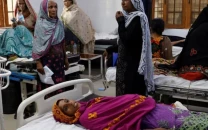Briefcase sized vent gets US patent
Device has been developed by local doctors in the city

A low cost, portable, briefcase-sized ventilator developed at the Aga Khan University Hospital by Pakistani doctors, biomedical engineers and software developers received a US patent.
The patent from the United States Patent and Trademark Office recognises over 20 innovative aspects of the University’s Resuscitation Automation Device, RAD, It can offer faster lifesaving treatment for patients suffering from critical respiratory problems.
People with severe forms of pneumonia or chronic obstructive pulmonary disease - two of the top ten leading causes of death in Pakistan - require immediate access to ventilators, but the cost and size of existing ventilators mean they are only available at hospitals.
“Patients facing breathing difficulties continue to face delays in receiving care due to two deficits in the clinical environment,” said Saleem Sayani, director of the Technology Innovation Support Centre and Digital Health Resource Centre at AKU.
“There is a shortage of trained personnel who can effectively operate manually pumped ambu bags for moderately ill patients, and there is also a lack of high-end ventilators for critically ill patients.”
The RAD aims to act as a bridge between manually operated ambu bags - which can be difficult, unreliable and distressing to use, while expensive ventilators have long waiting times. The patented device consists of a battery-operated motor that automatically inflates and deflates a medical-grade ambu bag in line with a self-adjusting, propriety algorithm that ensures a stable air supply to patients suffering from breathing difficulties.
Since the RAD is compact enough to fit in an ambulance, moderately ill patients can also potentially access care while on the way to hospital. Critically ill patients can also be put on the RAD while they wait for a ventilator to become available.
In addition, the RAD can be remotely operated through a mobile application which means that emergency room physicians can manage the device’s settings from afar, while the patient is in the ambulance to ensure that he/she reaches the facility in stable condition.
The app also gives hospital staff access to real-time data about the patient’s health before his or her arrival at the emergency room, enabling prompter care to be provided.
“Too many precious lives are lost due lack of timely ventilation. When available, many ventilators are either too complex to operate; too expensive or need a significant power source. Patients with infections, head injuries, drug overdose and heart conditions can be saved, especially at frontline healthcare facilities and during transport,” added AKU Center of Excellence for Trauma and Emergencies Director Dr Junaid Razzak.
“The use of low-cost mobile ventilators in ambulances, coupled with remote monitoring from the hospital through mobile technologies, has the potential to significantly improve patient outcomes and increase chances of survival, particularly in low-resource countries like Pakistan,” commented Asad Latif, Chair, Department of Anaesthesiology, AKU.
The idea for a portable, automated ventilator was initially pitched at AKU’s inaugural medical hackathon in August 2016. Dr Huba Atiq, assistant director at AKU’s Centre of Excellence for Trauma and Emergencies, was part of the team that proposed the idea.
Speaking about the inspiration for the RAD, she said: “In Pakistan, critically ill patients present late to healthcare facilities due to a lack of proper healthcare infrastructure. Even if they manage to reach the tertiary care facility after travelling a huge distance, the underdeveloped critical care process, lack of trained healthcare staff and resources, especially mechanical ventilators, results in an increased rate of critical care mortality. The invention of a low-cost, operator-friendly, mechanical ventilator represents a solution to bridge this gap and provide timely appropriate critical care services”.
Published in The Express Tribune, September 3rd, 2021.


















COMMENTS
Comments are moderated and generally will be posted if they are on-topic and not abusive.
For more information, please see our Comments FAQ